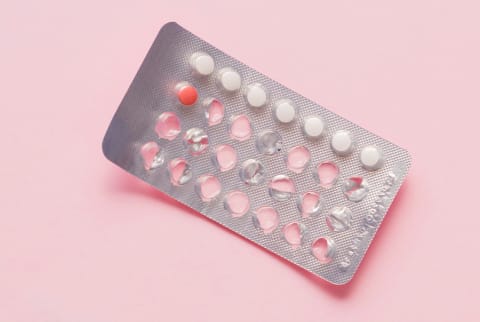Advertisement
Thinking Of Changing Birth Control Methods? You Need To Know This First


In my experience, when women are done with hormonal birth control, they are done. This can mean just jumping off the pill, pulling off the patch, or making a trip to the doctor to remove that IUD. But I want this to be as easy as possible on you, so here's the deal:
First, if you ever used hormonal contraceptives to treat symptoms, the chance of those symptoms returning is pretty big and it's part of post-birth-control syndrome. But we're going to leverage those symptoms within this program because they're going to guide you to your root cause and ultimately the best solutions for you.
Second, you have to decide what you're going to use next to not get pregnant. Even if you want to have a baby, as I said previously, you still want to give your body at least six months to recover, and if you can make it 12 months, that just makes my heart soar. (See chapter 13 for a variety of nonhormonal birth control options.) If you're still on hormonal contraception, start using the fertility awareness method to get in tune with your body and track changes in your cycle (again, see chapter 13). But this will not be a reliable birth control alternative until you've been off the pill for a few months. In the meantime, consider a complementary contraceptive until you dial in your natural cycle.
Once you've figured out your backup method for baby prevention, it's important to start looking at your individualized needs. Here are the general guidelines I give women within my practice:
1. If you started the pill solely for pregnancy prevention, are coming off it to get pregnant, or had mildly heavy periods, acne, and other bothersome symptoms, you can start the 30-Day Brighten Program and discontinue using the pill when you take the last pill in the pack. There is no need to wean yourself off the pill, but you don't want to stop in the middle of your pack because it can trigger a period sooner than you'd typically have it. And no one likes a double period.
2. If horrendous PMS, acne, bleeding, or any other kind of symptom is what got you on the pill in the first place, I recommend starting the 30-Day Brighten Program now and staying with it for at least three months before stopping hormonal birth control. That might sound a little discouraging or confusing, but don't let it be. Here's the deal: In this program, I outline everything you need to take care of your body, and most women will continue that for another three to six months because it takes at least a month or more to shift your menstrual cycle. The good news is that it takes less than a month to start feeling better. If you're a woman who has been diagnosed with endometriosis, PCOS, or another condition that can result in really heavy, painful periods, absent periods, or metabolic disturbances, you have to be really diligent about loving up your body. So if within this program you feel you need extra support, join our community (visit DrBrighten.com/Resources) because this is something a lot of women go through, and sadly, we often struggle on our own.
3. If you've already stopped the pill, you can jump right into the program. I help women on both ends of the spectrum, and this program absolutely can help you restore your hormonal health and ditch the weight, acne, mood issues, and PMS.
As you move into this program, remember that natural therapies take time. Be patient with your body. I say this because often women will come to my practice and say, "I tried Vitex [chaste tree berry], and I took it for 10 days, and it really didn't do anything for me." Well, Vitex takes an average of three months to take effect. You will be supporting the foundation of your gut, your liver, and your adrenal glands because once they're healthy and happy, the sex hormones will fall into alignment and it's easier to control inflammation, which is what makes those periods so painful, those moods so difficult, and that weight so sticky. Think about your health like the Titanic—a giant ship that is heading in the wrong direction. It's going to take some time to turn that ship around, and you don't want to change course so abruptly that you run into an iceberg and sink the whole thing. Natural therapies work with your body to turn that ship so it's heading in the right direction again. And that can take time. Pharmaceuticals basically strong-arm your body into submission, which is why they can work a lot quicker in some cases. There's a time and a place for pharmaceuticals, and I'm not judging you if you've used them, but I want you to have realistic expectations for how natural therapies work. The most rewarding part about these natural therapies is that you're not suppressing anything, which means that every day you're working toward improving your health, getting one step closer to your goal.
If you've taken the pill or any other hormonal contraceptives for a long period of time, no worries. You're here now, operating with the best knowledge you have, and we're going to keep you moving forward. So just to recap, if you are currently on these hormones, struggle with debilitating symptoms, and have tried to come off the pill before and it was just a wreck, dive right into the 30-Day Brighten Program in chapter 12, and try to stay on it for three months before coming off these hormones. Build up your body and really love it. Feed it with the nourishing recipes starting on page 291. You will not be able to undo everything that has been done, but you can move a little bit closer to health and then come off your hormonal birth control. I also understand if you're not ready to come off these hormones at all. I've worked with women in my practice who say, "Give me six months" or "Give me 12 months." The irony is that nobody ever needs 12 months because they usually reach a point where they think, Wait, I feel this good and I could feel better? OK, forget this noise. I want to get off these things. But if you need to stay on the pill a little bit longer, use this program to help keep your body as safe and as healthy as possible. If you're pregnant or breastfeeding, please check with your doctor before starting any new program.
Adapted from Beyond the Pill, copyright @ 2019 by Jolene Brighten, N.D. Published by HarperOne, an imprint of HarperCollins publisher.
Watch Next
Enjoy some of our favorite clips from classes
Enjoy some of our favorite clips from classes
What Is Meditation?
Mindfulness/Spirituality | Light Watkins
Box Breathing
Mindfulness/Spirituality | Gwen Dittmar
What Breathwork Can Address
Mindfulness/Spirituality | Gwen Dittmar
The 8 Limbs of Yoga - What is Asana?
Yoga | Caley Alyssa
Two Standing Postures to Open Up Tight Hips
Yoga | Caley Alyssa
How Plants Can Optimize Athletic Performance
Nutrition | Rich Roll
What to Eat Before a Workout
Nutrition | Rich Roll
How Ayurveda Helps Us Navigate Modern Life
Nutrition | Sahara Rose
Messages About Love & Relationships
Love & Relationships | Esther Perel
Love Languages
Love & Relationships | Esther Perel
What Is Meditation?
Box Breathing
What Breathwork Can Address
The 8 Limbs of Yoga - What is Asana?
Two Standing Postures to Open Up Tight Hips
How Plants Can Optimize Athletic Performance
What to Eat Before a Workout
How Ayurveda Helps Us Navigate Modern Life
Messages About Love & Relationships
Love Languages
Advertisement

What Men Are Getting Wrong About Mental Health, From A Psychologist
Stephen B. Poulter, PhD

Your Grandma's Go-To Supplement Is Once Again Popular (For A Good Reason)
Molly Knudsen, M.S., RDN

What Men Are Getting Wrong About Mental Health, From A Psychologist
Stephen B. Poulter, PhD

Your Grandma's Go-To Supplement Is Once Again Popular (For A Good Reason)
Molly Knudsen, M.S., RDN













